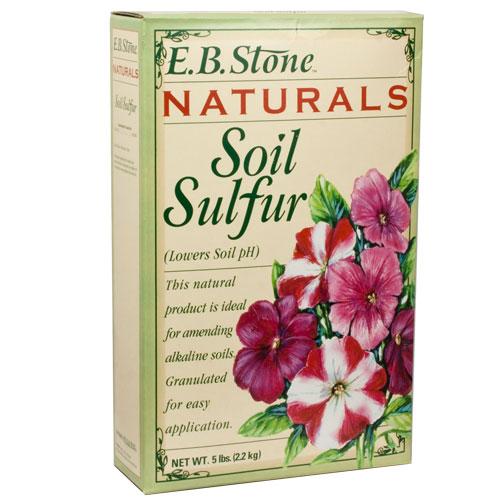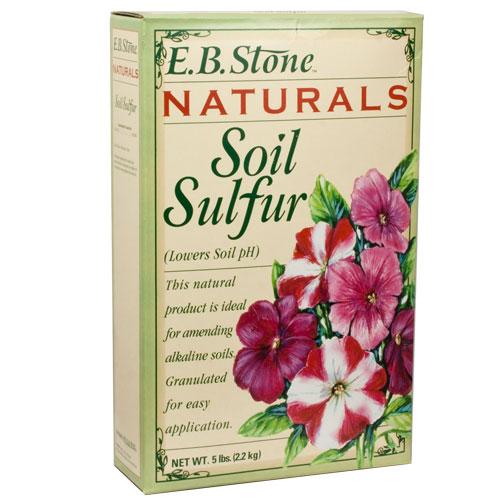Item Number: F290
Soil Sulfur (5 lb box)
Soil Sulfur (5 lb box)
Lowers Soil pH
In addition to adjusting the pH level of garden and lawn soils, Sulfur is an also an essential protein ingredient as well as plant nutrient which helps maintain the green color of leaves and aids in the use of nitrogen fertilizer by the plant.
- Contains elemental Sulfur
- Ideal for amending alkaline soils
- Granulated for easy application
The Role of Soil Sulfur:
Soil sulfur is essential because it directly influences the pH levels of your soil. pH, which stands for "potential of hydrogen," measures the acidity or alkalinity of the soil. Soil pH affects nutrient availability to plants and the overall microbial activity in the soil. Sulfur is particularly useful for adjusting pH in soils that are too alkaline or have high pH values.
Key Functions of Soil Sulfur:
Acidification: One of the primary roles of soil sulfur is to lower soil pH by increasing soil acidity. This is especially beneficial for soils with elevated pH levels, also known as alkaline soils. Acidification helps create a more favorable environment for nutrient uptake by plants.
Nutrient Availability: Soil sulfur plays a vital role in nutrient availability. When soil pH is too high (alkaline), certain essential nutrients like iron, manganese, and phosphorus become less accessible to plants. Adding sulfur can correct this issue by reducing pH and making these nutrients more readily available.
Microbial Activity: Soil sulfur can also impact soil microbial activity. It can help create conditions that favor beneficial soil microorganisms, which play critical roles in nutrient cycling and overall soil health.
Types of Soil Sulfur:
Elemental Sulfur: Elemental sulfur, also known as agricultural sulfur or elemental sulphur, is the most common form used as a soil amendment. It is typically in the form of finely ground sulfur particles. Elemental sulfur needs to be converted into sulfate form by soil microorganisms before it can lower soil pH effectively. This conversion process can take several weeks to months, depending on soil temperature and moisture levels.
Calcium Sulfate: Calcium sulfate, often in the form of gypsum, is another sulfur-containing soil amendment. Unlike elemental sulfur, calcium sulfate is already in sulfate form and can immediately lower soil pH. Additionally, calcium sulfate provides calcium, an essential nutrient for plant growth.
Using Soil Sulfur Effectively:
Soil Testing: Before applying soil sulfur, it's essential to conduct a soil test to determine your soil's pH level. This helps you make informed decisions about the amount of sulfur needed to achieve the desired pH.
Application Rates: Soil sulfur application rates vary based on your soil's current pH and the target pH. Follow the recommendations provided by your soil test results or consult with your local agricultural extension office for guidance.
Incorporation: Incorporate the sulfur into the soil thoroughly. You can do this by tilling, plowing, or mixing the sulfur with the topsoil.
Timing: Apply sulfur amendments well in advance of planting, as it takes time for the sulfur to react with the soil and lower pH. Plan ahead to ensure that your soil pH is at the desired level when you start planting.
Monitoring: Regularly monitor your soil's pH levels to ensure that they remain within the optimal range for your specific crops. Adjust sulfur application as needed based on soil test results.
Benefits of Soil Sulfur:
Improved Nutrient Availability: Lowering soil pH with sulfur enhances the availability of essential nutrients to plants, promoting healthy growth.
Optimized Microbial Activity: Sulfur can create a more favorable environment for beneficial soil microorganisms, which contribute to nutrient cycling and organic matter decomposition.
Increased Crop Yields: Properly adjusting soil pH with sulfur can lead to increased crop yields, especially in alkaline soils where nutrient availability is limited.
Sustainable Soil Management: Soil sulfur offers an environmentally friendly approach to soil management, reducing the need for synthetic chemical amendments.
Soil sulfur is a valuable tool for gardeners and farmers seeking to optimize soil pH, enhance nutrient availability, and improve overall soil health. By understanding the role of sulfur, choosing the appropriate type, and applying it effectively, you can create an environment that promotes healthy plant growth and bountiful harvests while supporting sustainable soil management practices.


Check Your Zone Compatibility:
Compatible with your zone.
Growing Zone for
,

Our Guarantee To You
Since 1976, we've served our customers at every stage of growing. Please contact us at any time. We are happy to support and assist you.
Description
Description
In addition to adjusting the pH level of garden and lawn soils, Sulfur is an also an essential protein ingredient as well as plant nutrient which helps maintain the green color of leaves and aids in the use of nitrogen fertilizer by the plant.
- Contains elemental Sulfur
- Ideal for amending alkaline soils
- Granulated for easy application
The Role of Soil Sulfur:
Soil sulfur is essential because it directly influences the pH levels of your soil. pH, which stands for "potential of hydrogen," measures the acidity or alkalinity of the soil. Soil pH affects nutrient availability to plants and the overall microbial activity in the soil. Sulfur is particularly useful for adjusting pH in soils that are too alkaline or have high pH values.
Key Functions of Soil Sulfur:
Acidification: One of the primary roles of soil sulfur is to lower soil pH by increasing soil acidity. This is especially beneficial for soils with elevated pH levels, also known as alkaline soils. Acidification helps create a more favorable environment for nutrient uptake by plants.
Nutrient Availability: Soil sulfur plays a vital role in nutrient availability. When soil pH is too high (alkaline), certain essential nutrients like iron, manganese, and phosphorus become less accessible to plants. Adding sulfur can correct this issue by reducing pH and making these nutrients more readily available.
Microbial Activity: Soil sulfur can also impact soil microbial activity. It can help create conditions that favor beneficial soil microorganisms, which play critical roles in nutrient cycling and overall soil health.
Types of Soil Sulfur:
Elemental Sulfur: Elemental sulfur, also known as agricultural sulfur or elemental sulphur, is the most common form used as a soil amendment. It is typically in the form of finely ground sulfur particles. Elemental sulfur needs to be converted into sulfate form by soil microorganisms before it can lower soil pH effectively. This conversion process can take several weeks to months, depending on soil temperature and moisture levels.
Calcium Sulfate: Calcium sulfate, often in the form of gypsum, is another sulfur-containing soil amendment. Unlike elemental sulfur, calcium sulfate is already in sulfate form and can immediately lower soil pH. Additionally, calcium sulfate provides calcium, an essential nutrient for plant growth.
Using Soil Sulfur Effectively:
Soil Testing: Before applying soil sulfur, it's essential to conduct a soil test to determine your soil's pH level. This helps you make informed decisions about the amount of sulfur needed to achieve the desired pH.
Application Rates: Soil sulfur application rates vary based on your soil's current pH and the target pH. Follow the recommendations provided by your soil test results or consult with your local agricultural extension office for guidance.
Incorporation: Incorporate the sulfur into the soil thoroughly. You can do this by tilling, plowing, or mixing the sulfur with the topsoil.
Timing: Apply sulfur amendments well in advance of planting, as it takes time for the sulfur to react with the soil and lower pH. Plan ahead to ensure that your soil pH is at the desired level when you start planting.
Monitoring: Regularly monitor your soil's pH levels to ensure that they remain within the optimal range for your specific crops. Adjust sulfur application as needed based on soil test results.
Benefits of Soil Sulfur:
Improved Nutrient Availability: Lowering soil pH with sulfur enhances the availability of essential nutrients to plants, promoting healthy growth.
Optimized Microbial Activity: Sulfur can create a more favorable environment for beneficial soil microorganisms, which contribute to nutrient cycling and organic matter decomposition.
Increased Crop Yields: Properly adjusting soil pH with sulfur can lead to increased crop yields, especially in alkaline soils where nutrient availability is limited.
Sustainable Soil Management: Soil sulfur offers an environmentally friendly approach to soil management, reducing the need for synthetic chemical amendments.
Soil sulfur is a valuable tool for gardeners and farmers seeking to optimize soil pH, enhance nutrient availability, and improve overall soil health. By understanding the role of sulfur, choosing the appropriate type, and applying it effectively, you can create an environment that promotes healthy plant growth and bountiful harvests while supporting sustainable soil management practices.
Shipping Information
Shipping Information
Shipping Weight: 5.1 lb
Dimensions: 11.0"L x 7.0"W x 3.5"H
Features
Features
Characteristics
Characteristics
Use Instructions
Use Instructions
Useful Information
Useful Information
Guarantee
Guarantee
Share


